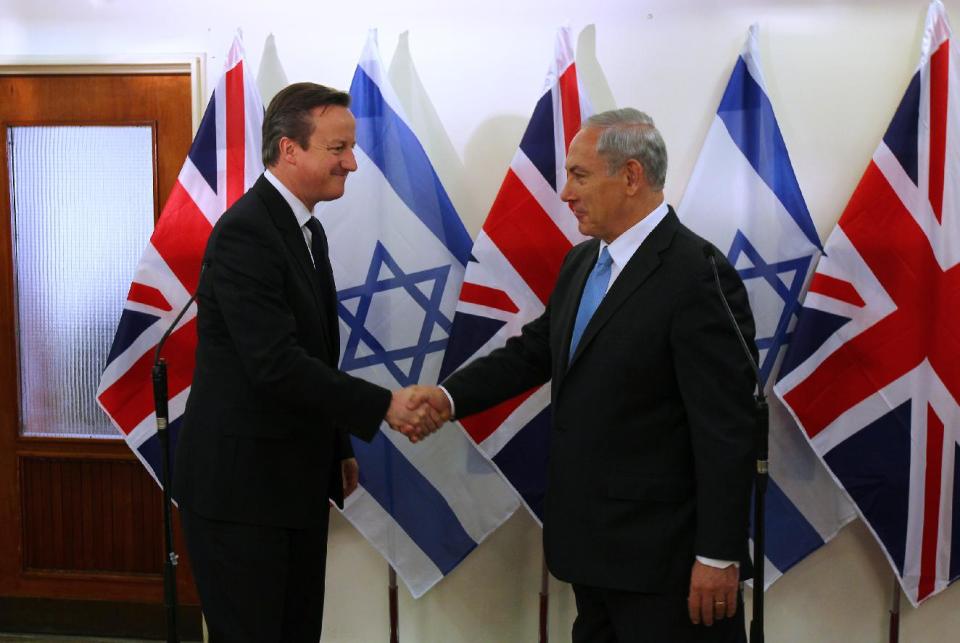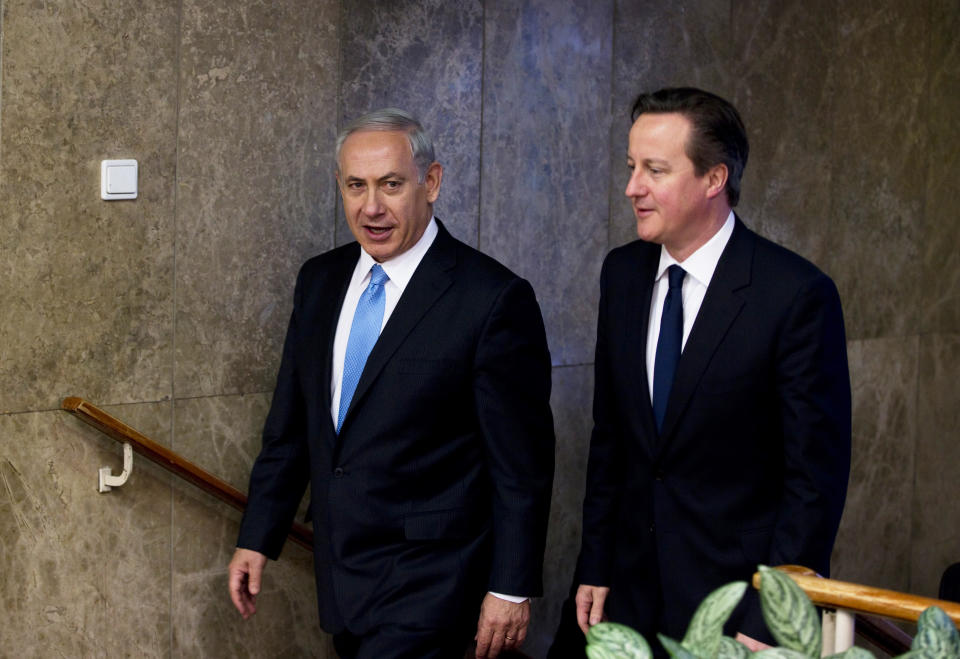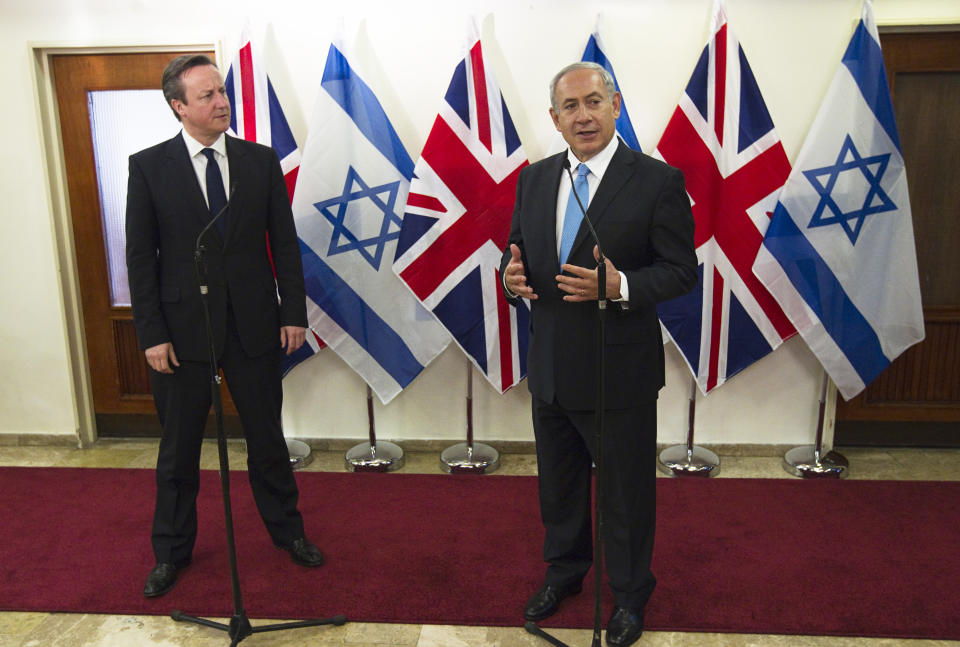Visiting British PM offers support to Israel
JERUSALEM (AP) — Visiting British Prime Minister David Cameron gave Israel a welcome boost of support from Europe Wednesday in a warm address to its parliament, vowing to stand by Israel in opposing a nuclear Iran, combating Islamic extremism and rejecting boycott attempts against the Jewish state.
In a speech peppered with expressions in Hebrew, Cameron mentioned his own Jewish ancestors and Britain's crucial role in Israel's establishment. While voicing support for U.S.-led peace talks, Cameron mostly steered clear of Israeli policies that have drawn fire, with only passing criticism of West Bank settlement construction.
He did not offer advice, a common practice of visiting leaders which many Israelis find annoying, but rather asked Israelis to "imagine" the benefits of peace.
"Let me say to you very clearly: With me, you have a British prime minister whose belief in Israel is unbreakable and whose commitment to Israel's security will always be rock solid," Cameron said in his first visit to Israel as prime minister. "We will be with you every step of the way."
The reassuring words were welcomed in Israel, which has come under some tough criticism in Europe.
The heaviest international censure is leveled at Israeli construction of Jewish settlements in the West Bank and east Jerusalem, war-won lands claimed by the Palestinians. The United States and European Union consider settlement construction illegal or illegitimate, and have warned that Israel could face growing isolation if the current round of peace talks with the Palestinians — set to end next month — fails.
Cameron made only a brief mention of settlement construction, coupling it with a call to end Palestinian incitement against Israel.
Buoyed by the Palestinian-led movement calling for a boycott, divestment and sanctions against Israel, some businesses and pension funds in Europe have recently cut investments or trade with Israeli firms they say are connected to West Bank settlements.
Israel charges the boycott has strong anti-Semitic connotations and is meant to delegitimize the Jewish state as a whole, and not merely a pressure tactic against its policies toward the Palestinians. For many Israelis, the boycott conjures up dark images of the Nazi boycott prior and during WWII when Jewish academics were kicked out of universities and Jewish businesses were vandalized and boycotted.
Cameron said he would fight efforts to boycott Israel or try to "delegitimize" it. But he also urged Israel to imagine what peace could do for it, such as ending the "outrageous lectures" Israel currently faces from its adversaries.
"Imagine mutual recognition of the nation-state of the Palestinian people and the nation-state of the Jewish people," he said. "An end to the ridiculous situation where last year the United Nations General Assembly passed three times as many resolutions on Israel than on Syria, Iran and North Korea put together ... Imagine Israel, like any other democratic nation, finally treated fairly and normally by all."
Israeli Prime Minister Benjamin Netanyahu has said the criticism of settlement construction is unfair and out of proportion, and angrily accused the world of ignoring misdeeds by the Palestinians. This week he complained that the world had remained silent over Israel's seizure of a cargo ship allegedly carrying rockets from Iran to Palestinian militants in the Gaza Strip.
Netanyahu used the episode to play up what he says is the threat from Iran, which Israel and the West believe are trying to develop nuclear weapons capability. Iran denies the charge.
Cameron condemned what he called Iran's "despicable" attempt to smuggle weapons into Gaza and the repeated rocket fire from that territory. Shortly after his speech, Gaza militants fired more than 20 rockets into southern Israel.
Cameron also criticized what he said was a history by the Palestinian government in the West Bank of venerating people who have carried out attacks on Israelis. The West Bank government is currently in talks with Israel.
Cameron's visit came amid a tense week at the Israeli parliament with the passing of three controversial bills. The opposition boycotted the votes to protest what it said were strong-arm tactics by the ruling coalition. Cameron sat patiently on the dais as opposition lawmakers heckled Netanyahu and exited the chamber. They returned in time for Cameron's address.
Israel's parliament, or Knesset, is well-known for its boisterous sessions. Last month, nationalist lawmakers stormed out of an address by the visiting president of the European Parliament.
"Well, if I was thinking of missing prime minister's questions in the House of Commons and finding somewhere to spend a quiet Wednesday afternoon clearly I've come to the wrong place," Cameron said, to applause and laughs from the chamber. "My ambassador did warn me about what may happen here today. He said people may shout, some people might leave, fights may break out. He said you may learn the meaning of a new word: 'Balagan,'" Hebrew for "a mess."



